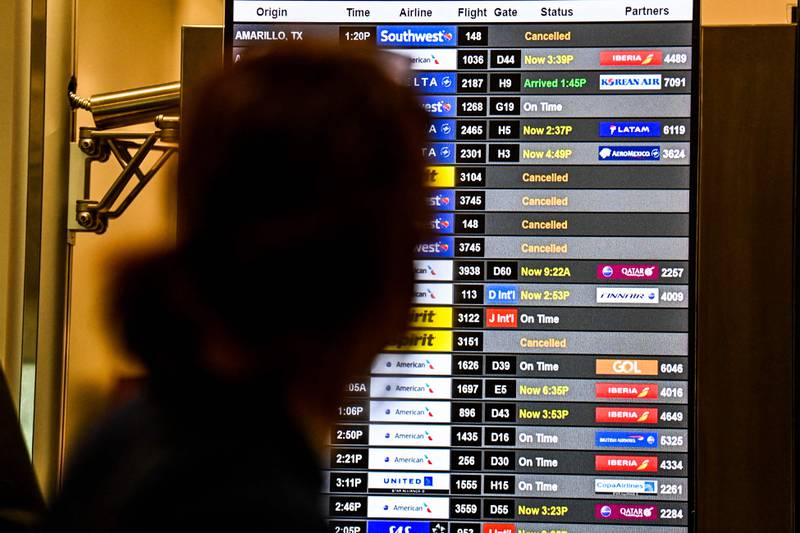Flight disruptions will not derail airlines' recovery in 2022, says Moody's

The wave of flight cancellations due to a surge in Covid-19 cases globally and bad weather in some locations will not hurt the airline industry's recovery during the year, according to Moody's Investors Service.
The airline industry is grappling with the dual challenges of severe weather in the US and crew getting infected with coronavirus as the highly-transmissible Omicron variant drives a surge in cases, resulting in thousands of flight cancellations and delays during the peak holiday travel season.
But the impact on the airline industry will be "fleeting", with flight cancellations posing only a "temporary problem" and the cancellations will ease in upcoming weeks as the weather improves and the infection rate declines, Moody's said in a report on Thursday.
Nearly 5,000 flights were cancelled and 12,689 were delayed on Thursday, according to aviation data tracker FlightAware. By Friday afternoon, 4,370 flights were cancelled. There have been more than 20,000 cancellations since Christmas Eve, representing about 5 to 10 per cent of airlines' daily schedules.
"We expect the financial impact of the cancellations to be modest, marginally lowering operating cash flow in these weeks," Moody's said. "The staffing challenges caused by the rapid spread of the Omicron variant will ease as daily infection rates decline, enabling airlines to quickly improve their operating performance relative to the past few weeks."
Passenger volumes will snap back strongly through 2022 and into 2023, driving a positive industry outlook, according to Moody's analysts.
"There remains tremendous pent-up demand for air travel, be it leisure, long-haul international or business," the report's co-authors said.
During the first quarter of 2022, governments’ travel requirements – vaccinations, negative test results, quarantines and other measures – will remain the "primary impediment" to airline bookings but such restrictions will ease with a sustained decline in average daily infection rates, the report said.
Business travel by large companies is expected to ramp up, Moody's said. The segment has lagged behind leisure travel as companies have slashed their budgets, relied on video-conferencing technologies and kept their employees off the road as part of health and safety measures.
"Before Omicron, we expected this to start in January but now expect that an improvement in business travel by large companies will be delayed to the second half of the first quarter," the report said.
Moody's projects that revenue for the 20 airline companies it rates – which accounted for about 35 per cent of the global industry’s revenue in 2019 – will reach about $275 billion in 2022, up more than 60 per cent from 2021.
With a similarly positive outlook, global consultancy Deloitte said that Covid-19 vaccines are helping to clear a path toward normalisation of air travel.
"Current macroeconomic trends suggest that demand for small- and medium-sized aircraft will continue to recover to reach pre-Covid levels in 2022, with aircraft manufacturers focused on narrow-body aircraft being well positioned to benefit from this buoyant demand," Deloitte said in its 2022 aerospace and defence industry outlook.
Merger and acquisition deals should remain strong in 2022 with innovation, technology transformation, and geopolitical and regulatory shifts driving robust deal-making across industry segments in commercial aerospace, defence and space, it said.
"Global deal activity is also likely to be driven by improved liquidity, especially at financially strong companies that may prioritise M&A to drive long-term growth," Deloitte said.
For airlines that are brave enough to look beyond Omicron, the second quarter of the year looks positive, aviation data firm OAG said in a report.
Strong pent-up demand has already resulted in carriers adding back aircraft such as the Airbus A380 and reopening long-haul routes in many markets, suggesting that air travel demand is improving, OAG said.
"Things are getting better but as we have always said, there will be bumps in the road to recovery; some steeper and deeper than others. We do just need to get past the first quarter of 2022, as indeed getting through the first quarter has always been the crucial period in this industry," OAG analyst John Grant said.
Global airline capacity ended 2021 at 5.7 billion seats compared with the 8.7 billion reported in 2019, which is 35 per cent below pre-Covid levels, according to OAG data.
